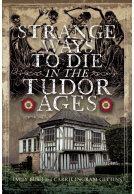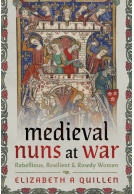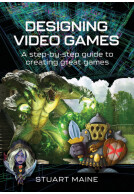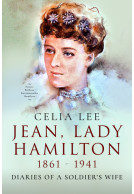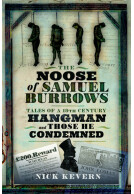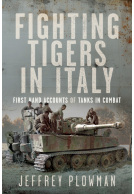"‘Sometimes all a person needed to do in the sixteenth century to fall victim to misfortune was to simply go for a walk and fate would find them.’ An entertaining read! Filled with many stories of people’s finally moments in life that ended in some unusual ways. A must for history readers. ‘Suddenly, a sack of flour fell from high above her, landing on her face and chest.’"
NetGalley, Georgi Lvs Books
"Rating: 5 out of 5 stars An incredibly accessible, well researched, and approachable book on an incredibly interesting part of women’s history in medieval Europe. Medieval Nuns at War: Rebellious, Resilient & Rowdy Women, by Elizabeth A Quillen, is, hands down, one of the best books I’ve read so far this year. Quillen expertly balances fantastic research and voice, making each account come alive. Facts (as we understand them) are illustrated with action and personalization that, while speculative, are appropriate to the scene being set. Spanning roughly 1,000 years of history, Medieval Nuns introduces the reader to a series of stories of historic women who persistently challenged what religious life could look like for medieval women, how religious life could also intersect with the civic, and how history is always so much more than we think. Quillen’s writing skill, in particular, shines when telling the story of one specific person at a time. Chapter 1 focuses on the Saint-Croix monastery, located in Poitiers, France, which was also in the at-the-time Merovingian domain. (This region had not yet been fully converted to Christianity.) Civic and religious authorities were in constant change, which left substantial room for new definitions of religious life. In Chapter 2, Quilen focuses on Saint Leoba and her work with Saint Boniface in Saxony. This point in time yielded a number of convents that were headed by daughters of the imperial family. In Chapter 3, Quillen writes of Margaret of Beverley and Hildegund von Schonau, women who were active in the first century of the Crusades. Chapter 4, in particular, I found particularly compelling, and in which Quillen’s eye for narrative truly shines: We meet Marguerite Porete, a beguine nun who authored The Mirror of the Simple Soul, a theological text that was considered heretical. Quillen takes the time to really explore Porete’s theology, which centered around the goal to dissolve oneself in the divine and give oneself over completely to love. The beguines were also fascinating; they lived somewhat religious lives, did not take formal vows, and could leave any time to get married or move on with other personal affairs. Chapter 5 centers on the convent of Le Murate, a group of unaffiliated religious women living together in Florence. Though they eventually affiliated themselves with a religious order to save one sister from an unwanted marriage, the convent’s continued prosperity hinged on navigating de’ Medici family politics and one of the most violent periods in Florence history. The convent thrived under the guiding hand of Scholastica Rondielli, who saw the establishment of an apothecary, additional building projects, and much, much more. Chapter 6 celebrates Catalina/Antonio de Erauso, a challenging yet popular figure from Spain. At 15, Catalina fled her convent and started a life of adventure as a man. This particular chapter reads as an incredibly compelling adventure tale, with Antonio going overseas to fight in wartime; end up in bloody disputes over gambling, and lead a rambling, free life. While some of the history of Antonio’s life seem too good to be true; Quillen does note that many of the names he claims to have encountered (for fortuitous and dangerous reasons) have left correspondence concerning him. Medieval Nuns at War: Rebellious, Resilient & Rowdy Women is a must-read for anyone interested in medieval European history, and especially a fantastic book for anyone interested in reading more nonfiction and exploring what reading history has to offer. And with Quillen’s writing style, you will, more than once, start thinking of these women from history as very cool family ancestors."
NetGalley, Laura Kemmerer
"Rating: 5 out of 5 stars I'm not Catholic, so I have very limited knowledge on this topic. Beyond not reading much about nuns or the Catholic Church, I haven't read much about the Medevial period. So this was pretty much all new information to me, which was wonderful. So many times, I read a non-fiction book and already know so much of it (although that doesn't have anything to do with the book, just my knowledge of the subject). This was so interesting and well researched. It immediately pulled me in, and I didn't want to put it down. There were so many amazing stories in here, detailing the lives of these women (being a nun doesn't take away from the fact they are women at all). Definitely would recommend!"
NetGalley, Rebecca Stewart
"Name-dropping Winston Churchill got my attention right away! Through Lady Hamilton’s diaries, it was an insight into not only her marriage during a horrific time but Mr Churchill’s too. British aristocracy and nobility is front and center as Jean’s diaries revealed much about their personal lives and their reactions to the huge events of the turn of the century. Highs, lows and everything in between were relayed from her perspective as well as the knowledge of that time. A fascinating piece of personal history that adds to the public record of not only their lives but also of the Great War. I believe history, biography and war buffs alike would enjoy this book."
NetGalley, Diane Radtke
"Elizabeth A. Quillen delivers a fascinating deep dive into the lives of combative, resilient, and rebellious nuns throughout history. Drawing on centuries of research, she highlights not only their actions but also their aristocratic backgrounds, showing how their origins shaped the paths they took and the roles they carved out for themselves. I found it engrossing to see where these women came from and where they ultimately ended up. The book offers a wide lens on how society viewed women particularly in a secular context—which added a rich layer to the historical detail. While the tone sometimes leaned more toward academic research than narrative storytelling, it remained accessible and engaging to read. My favorite section was the opening chapters on the 6th century, which set the stage brilliantly. This is certainly a niche book, but very much up my alley. I am Catholic so it was deep within me to enjoy this. I plan to buy a physical copy so I can reread and annotate at my leisure."
NetGalley, Chantal Munu
"Rating: 5 out of 5 stars Memoirs of a Child Holocaust Survivor: Living Without Hatred by A. M. Fox is a powerful and deeply moving account of resilience, memory, and humanity. Through vivid recollections, it preserves both the warmth of a vibrant family life before the war and the unimaginable horrors endured under Nazi rule. It's very hard to read, but it's also really important to read. It's honest, heartfelt, and at times, heartbreaking, but the author has done such a good job of honoring lost loved ones and bearing witness with dignity."
NetGalley, Annalise Clark
"I am a great lover of dark history, but usually don't consume it in book form. I am also a great believer that real History, as a discipline, is best told by everyday people rather than the people who hold the most power at the time. Imagine glee at finding a non-fiction book which combines the two. 'The Hangman's Noose' is not a philosophical debate on capital punishment or intended as either criticism or praise of the people whose job it was to carry it out. Instead it gives us a look at the lesser-known side of Georgian England, one away from the opulence and excesses. The author tells the story of Samuel Burrows - the last hangman in the city of Chester - through the stories of those he executed and their crimes. His work underwent major reform in his lifetime and the book gives the reader insights into major events in British history (Luddite and Swing riots), shows the impact of major events such was the Napoleonic Wars, and also narrates the changes in attitudes towards crime and punishment. As well as being well researched and told in an engaging way, it's lovely to see the authors clear affection for his home city and its history come through. Definitely well worth a read."
NetGalley, Kelly Lake
"Watch the full review here"
Detail Scale View







